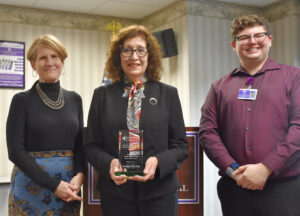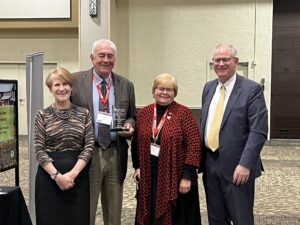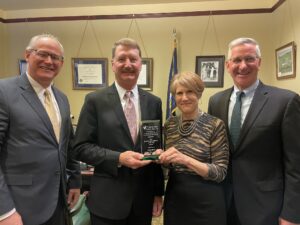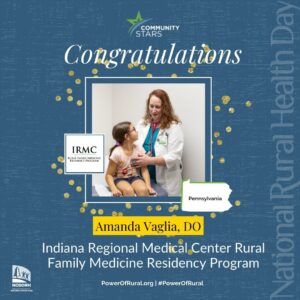- Weathering the Storm Together: Community Resiliency Hubs Hold the Promise of Local Self-Sufficiency and Supportive Mutual Aid
- Virginia Tech Researchers Bring Rural Families into the Nation's Largest Study of Early Brain and Child Development
- Expanding Access to Cancer Care for Rural Veterans
- VA: Veterans Rural Health Advisory Committee, Notice of Meeting
- Scaling Rural Wellness with Clever Collaboration
- Stroudwater Associates Enhances Rural Healthcare Dashboard with New Data to Support State Rural Transformation Grant Applications
- Harvest Season Is Here: Busy Times Call for Increased Focus on Safety and Health
- HHS Dispatches More Than 70 Public Health Service Officers to Strengthen Care in Tribal Communities
- Wisconsin Rural Hospitals Team up to Form Network
- CMS Launches Landmark $50 Billion Rural Health Transformation Program
- American Heart Association Provides Blood Pressure Kits at Southeast Arkansas Regional Libraries to Support Rural Health
- Broadening Access to Minimally Invasive Surgery Could Narrow Rural-Urban Health Gaps
- Instead of Selling, Some Rural Hospitals Band Together To Survive
- Help Line Gives Pediatricians Crucial Mental Health Information to Help Kids, Families
- Rural Health: A Strategic Opportunity for Governors
Leader at Wayne Memorial Community Health Centers, Norma Nocilla, Receives Community Rural Health Leader of the Year Award
 Norma Nocilla, director of clinical operations and quality at Wayne Memorial Community Health Centers (WMCHC), Honesdale, PA, received the 2022 Community Rural Health Leader of the Year Award, presented by the Pennsylvania Office of Rural Health (PORH). The award was presented by Lisa Davis, director of PORH and outreach associate professor of health policy and administration at Penn State during an award ceremony on Nov. 17, 2022, at Wayne Memorial Hospital in Honesdale, PA.
Norma Nocilla, director of clinical operations and quality at Wayne Memorial Community Health Centers (WMCHC), Honesdale, PA, received the 2022 Community Rural Health Leader of the Year Award, presented by the Pennsylvania Office of Rural Health (PORH). The award was presented by Lisa Davis, director of PORH and outreach associate professor of health policy and administration at Penn State during an award ceremony on Nov. 17, 2022, at Wayne Memorial Hospital in Honesdale, PA.
The Community Rural Health Leader of the Year Award recognizes an outstanding leader who organized, led, developed or expanded an exemplary multi-dimensional rural community health program or initiative and who has demonstrated leadership to a rural community health program.
The award was presented during 2022 Rural Health Week in Pennsylvania, Nov. 14-18. The week encompasses Nov. 17, which is National Rural Health Day, established in 2011 by the National Organization of the State Offices of Rural Health. Both events celebrate “The Power of Rural” by honoring rural American residents, health care providers, and communities.
The nomination, submitted by Kyle Davis, outreach and enrollment coordinator at WMCHC, recognized Nocilla for her extensive background in health care leadership, quality, and performance improvement. Nocilla has held various roles that provided her not only with insight into the needs of her community, but state and national issues as well. Nocilla maintained oversight of the clinical integration of four large practice groups across eight sites and 17 providers, earning primary care medical home certification of all sites, which places patients at the center of care and builds meaningful relationships between patients and clinical care teams. She shows concern and recognition for her colleagues and acknowledges the influential role they play in helping WMCHC provide exceptional services to the counties and organizations served by the health center.
Davis stated, “Ms. Nocilla has demonstrated a high level of dedication to bringing high-quality care to our communities. This dedication has been apparent in the achievements outlined above as well as her influence in creating a culture that recognizes and rewards employees for positive patient outcomes while placing an emphasis on learning and designing systems that respond to employees in a fair and just manner.”
PORH was formed in 1991 as a joint partnership between the federal government, the Commonwealth of Pennsylvania, and Penn State. The office is one of 50 state offices of rural health in the nation and is charged with being a source of coordination, technical assistance, networking, and partnership development.
PORH provides expertise in the areas of rural health, population health, quality improvement, oral health, and agricultural health and safety. PORH is administratively located in the Department of Health Policy and Administration in the College of Health and Human Development at Penn State University Park.
Each year, PORH presents awards to recognize rural health programs and individuals who have made substantial contributions to rural health in Pennsylvania. To learn more about the Pennsylvania Office of Rural Health, visit porh.psu.edu.
Agriculture Advocate Denny Hutchison Receives State Rural Health Leader of the Year Award

Denny Hutchison, membership chair and past president of the Somerset County Farm Bureau, and member of the Pennsylvania Farm Bureau (PFB) Agricultural Promotion Committee, from Somerset County, PA, received the Rural Health Leader of the Year award, presented by the Pennsylvania Office of Rural Health (PORH). The award was presented by Lisa Davis, director of PORH and outreach associate professor of health policy and administration at Penn State, during a ceremony on Nov. 15, 2022 at the annual PFB meeting, at the Hershey Lodge and Convention Center, Hershey, PA.
The Rural Health Leader of the Year award recognizes an outstanding leader from Pennsylvania for their work and support of rural health initiatives that address an identified need in their district or across the state.
The award was presented during 2022 Rural Health Week in Pennsylvania, Nov. 14-18. The week encompasses Nov. 17, which is National Rural Health Day, established in 2011 by the National Organization of the State Offices of Rural Health. Both events celebrate “The Power of Rural” by honoring rural American residents, health care providers, and communities.
Nominations were submitted by Pennsylvania Secretary of Agriculture Russell Redding; Pastor Nila Cogan of Somerset County; Pennsylvania Rural Development Council Executive Director Mark Critz; James Wyler, from Ambulatory and Community Behavioral Health Network Services at UPMC Western Psychiatric Hospital; and Andrea Brown from UPMC. The nominators recognized Hutchison’s superb community outreach and statewide call for support of mental health needs in local agricultural communities.
Hutchison was lauded for his assistance in developing a crisis line and underwriting training that focuses on learning about the stressors in the agricultural community, recognizing and helping someone in crisis, and developing mechanisms to mitigate the stress. During COVID-19, Hutchison raised awareness in the farming community in Somerset County, discussing rural stress and the mental burden on farmers and their families. He reached out to veterinarians, feed and equipment dealers, and others who interact with farmers to alert them to warning signs of stress and depression. He is currently working with the PFB to raise awareness and make treatment more accessible for Pennsylvania’s farmers.
Hutchison also serves as treasurer, and executive board member of the Somerset County Chamber of Commerce, as a board member of the United Way of Laurel Highlands, and is a member of the Paint Township Planning Committee. He worked for 37 years as a vocational rehabilitation counselor for the Pennsylvania Office of Vocational Rehabilitation. Hutchison is married to his wife, Lori, and enjoys time with his two daughters and two granddaughters.
PORH was formed in 1991 as a joint partnership between the federal government, the Commonwealth of Pennsylvania, and Penn State. The office is one of 50 state offices of rural health in the nation and is charged with being a source of coordination, technical assistance, networking, and partnership development.
PORH provides expertise in the areas of rural health, population health, quality improvement, oral health, and agricultural health and safety. PORH is administratively located in the Department of Health Policy and Administration in the College of Health and Human Development at Penn State University Park.
Each year, PORH presents awards to recognize rural health programs and individuals who have made substantial contributions to rural health in Pennsylvania. To learn more about the Pennsylvania Office of Rural Health, visit porh.psu.edu.
Pennsylvania Senator Elder Vogel, Jr. Receives Rural Health Legislator of the Year Award

Pennsylvania Senator Elder Vogel, Jr. received the Rural Health Legislator of the Year Award, presented by the Pennsylvania Office of Rural Health (PORH). The award was presented by Lisa Davis, director of PORH and outreach associate professor of health policy and administration at Penn State, during a ceremony on Nov. 15, 2022, at the Main Capitol Building in Harrisburg, PA.
The Rural Health Legislator of the Year Award recognizes an outstanding legislator from Pennsylvania for their work and support of rural health initiatives that address an identified need in their district or across the state.
The award was presented during 2022 Rural Health Week in Pennsylvania, Nov. 14-18. The week encompasses Nov. 17, which is National Rural Health Day, established in 2011 by the National Organization of the State Offices of Rural Health. Both events celebrate “The Power of Rural” by honoring rural American residents, health care providers, and communities.
The nomination, submitted by Pennsylvania Secretary of Agriculture Russell Redding, recognized Vogel for recognizing and addressing the mental health needs of the agricultural community and bringing statewide and community attention to this important issue. As a fourth-generation farmer, Vogel is abundantly aware of the significance of this issue and the missed cries for help. He continues to discuss, share helpful resources, and advocate for the farming community. Vogel also is a compelling advocate of telemedicine for agricultural and rural communities. He sponsored legislation that has defined telemedicine and provided opportunities for rural areas to receive specialized care, including mental health services, without traveling outside the community.
PORH was formed in 1991 as a joint partnership between the federal government, the Commonwealth of Pennsylvania, and Penn State. The office is one of 50 state offices of rural health in the nation and is charged with being a source of coordination, technical assistance, networking, and partnership development.
PORH provides expertise in the areas of rural health, population health, quality improvement, oral health, and agricultural health and safety. PORH is administratively located in the Department of Health Policy and Administration in the College of Health and Human Development at Penn State University Park.
Each year, PORH presents awards to recognize rural health programs and individuals who have made substantial contributions to rural health in Pennsylvania. To learn more about the Pennsylvania Office of Rural Health, visit porh.psu.edu.
Glenn Sterner, Ph.D., of Penn State Abington, Receives Rural Health Hero of the Year Award
 Glenn Sterner, Ph.D., assistant professor criminal justice at Penn State Abington, received the Rural Health Hero of the Year Award, presented by the Pennsylvania Office of Rural Health (PORH). The award was presented by Lisa Davis, director of PORH and outreach associate professor of health policy and administration at Penn State on Nov. 14, 2022 during a ceremony at Penn State Abington in Abington, PA.
Glenn Sterner, Ph.D., assistant professor criminal justice at Penn State Abington, received the Rural Health Hero of the Year Award, presented by the Pennsylvania Office of Rural Health (PORH). The award was presented by Lisa Davis, director of PORH and outreach associate professor of health policy and administration at Penn State on Nov. 14, 2022 during a ceremony at Penn State Abington in Abington, PA.
The award was presented during 2022 Rural Health Week in Pennsylvania, Nov. 14-18. The week encompasses Nov. 17, which is National Rural Health Day, established in 2011 by the National Organization of the State Offices of Rural Health. Both events celebrate “The Power of Rural” by honoring rural American residents, health care providers, and communities.
The Rural Health Hero of the Year award recognizes an outstanding leader who demonstrates a personal and professional commitment to the rural health needs of their community, works with relevant organizations to develop or expand a program that addresses an identified need, and goes above and beyond the call of duty.
The nomination, submitted by Danielle Rhubart, Ph.D. assistant professor of biobehavioral health at Penn State University Park, lauded Sterner for his leadership and coordination between organizations across the state. In addition to being a champion and advocate for rural communities, his work on substance use, human trafficking, and various health conditions have had meaningful impacts on rural residents of Pennsylvania. He uses an innovative approach to address multiple issues, secure funding, and has worked in partnership with state and local law enforcement agencies to deploy resources. Sterner is an influential advocate in multiple areas and consistently demonstrates his recognition of rural health issues across Pennsylvania.
In his current work, he is evaluating the impact of opioid settlement funding in Pennsylvania, with an emphasis on long-term stakeholder engagement for maximizing the impact of opioid settlement funding in Pennsylvania’s communities. He founded the non-profit organization “Regional Interdisciplinary Collaborative Working to Address Human Trafficking.” He also serves on an interdisciplinary team to increase access to prevention programming in rural counties through the Penn State PROmoting School-community-university Partnerships to Enhance Resilience (PROSPER) program, emphasizing connections between prevention and supply reduction initiatives in communities. Sterner developed the Story Powered Initiative to address stigma in communities for conditions that are discriminated against, including substance use, human trafficking, hepatitis C, and HIV/AIDS.
PORH was formed in 1991 as a joint partnership between the federal government, the Commonwealth of Pennsylvania, and Penn State. The office is one of 50 state offices of rural health in the nation and is charged with being a source of coordination, technical assistance, networking, and partnership development.
PORH provides expertise in the areas of rural health, population health, quality improvement, oral health, and agricultural health and safety. PORH is administratively located in the Department of Health Policy and Administration in the College of Health and Human Development at Penn State University Park.
Each year, PORH presents awards to recognize rural health programs and individuals who have made substantial contributions to rural health in Pennsylvania. To learn more about the Pennsylvania Office of Rural Health, visit porh.psu.edu.
Amanda Vaglia, D.O. Recognized as 2022 Rural Health Community Star

Amanda Vaglia, D.O, Primary Care Physician and Program Director at Indiana Regional Medical Center’s Rural Family Medicine Residency Program, Indiana Regional Medical Center, Indiana. PA, is Pennsylvania’s 2022 Community Star, designate by the National Organization of State Offices of Rural Health (NOSORH). NOSPRH, the member association for each of the 50 State Offices of Rural Health, leads National Rural Health Day. The Pennsylvania Office or Rural Health, University Park, PA, collaborates with NOSORH to recognize those who serve the vital needs of the estimated 57 million people living in rural America.
The nomination, submitted by Lisa Davis, MHA, Director and Outreach Associate Professor of Health Policy and Administration, Pennsylvania Office of Rural Health, University Park, PA, lauded Vaglia’s advocacy for developing the Rural Physician Residency Program at Indiana Regional Medical Center (IRMC), to ensure access to high quality health care and to training the next cohort of talented rural primary physicians. Davis notes, “Dr. Vaglia has deep roots in rural Pennsylvania and has spent her academic and professional career on providing high quality primary care to generations of families, from birth to geriatrics.”
Dr. Vaglia has been a true rural health community champion and star. She has recognized the need to recruit and retain physicians in her community, cultivate rural leadership and practice in medical residents, and address rural population health. Dr. Vaglia is focused on education, collaboration, and communication that led the efforts to fulfill the vision of establishing a family medicine residency program at IRMC, which serves as the rural sole community hospital in the county. The Rural Residency Program has at its core, the mission of providing excellent, comprehensive, family medicine training so that graduates might fill health care disparities in rural Pennsylvania communities.
Dr. Vaglia also serves on statewide Pennsylvania Rural Physician Pathway Planning Committee, a collaboration between the Area Health Education Center program, rural clinical training programs across the state, the Pennsylvania Primary Care Career Center, the Pennsylvania Academy of Family Physicians, and the Pennsylvania Office of Rural Health, to envision an innovative clinical pipeline for recruitment, training, and retention in rural communities.
The National Organization of State Offices of Rural Health’s (NOSORH) annual Community Star recognition program is one of the most popular features of National Rural Health Day. Each person, coalition, and organization nominated to be their state’s Community Star represents the faces and grassroots initiatives that are working to address the social determinants of health and improve the lives of those who call rural their home. The 2022 Community Stars book can be accessed at www.powerofrural.org.
Gov. Tom Wolf Proclaims November 14-18, 2022 Rural Health Week in Pennsylvania
In an effort to draw attention to the wide range of issues that impact rural health, Gov. Tom Wolf has declared Nov. 14-18, 2022, as Rural Health in Pennsylvania week at the request of the Pennsylvania Rural Health Association (PRHA) and the Pennsylvania Office of Rural Health (PORH).
Gov. Wolf made the proclamation to promote awareness of the full range of issues that impact rural health care throughout the Commonwealth and the health status of rural Pennsylvanians. Nationally, Pennsylvania ranks as one of the states with the highest number of rural residents, with 26 percent of Pennsylvanians residing in rural areas. In recognition of Pennsylvania’s diverse rural needs, the Commonwealth has supported the development of the Center for Rural Pennsylvania, the Pennsylvania Office of Rural Health, and other agencies and initiatives to address the needs of rural Pennsylvanians.
The week encompasses Nov. 17, which is National Rural Health Day, established in 2011 by the National Organization of State Offices of Rural Health (NOSORH) to showcase rural America; increase awareness of rural health issues; and promote the efforts of NOSORH, State Offices of Rural Health (SORHs) and others in addressing those issues.
“Nearly 59.5 million Americans, including 3.4 million Pennsylvanians, live in rural communities,” said Lisa Davis, PORH director and outreach associate professor of health policy and administration at Penn State. “These small towns and communities continue to be fueled by the creative energy of citizens who step forward to provide a wealth of products, resources, and services.
Rural communities also face unique health care concerns: a lack of providers; accessibility issues, particularly in terms of transportation and technology; and affordability issues as the result of larger percentages of uninsured and underinsured citizens and greater out-of-pocket health costs. Rural hospitals and health care providers, which frequently are the economic backbone of the communities they serve, deserve special consideration so that they can continue to provide high-quality services and meet the needs of rural residents.”
To celebrate the work being done to achieve health care access and equity in Pennsylvania, PORH will present Pennsylvania Rural Health Awards during in communities across Pennsylvania.
PORH was established in 1991 to enhance the health status of rural Pennsylvanians and strengthen the delivery and quality of care in the communities in which they live. Each year, the organization presents awards to recognize rural health programs and individuals who have made substantial contributions to rural health in Pennsylvania. To learn more about the Pennsylvania Office of Rural Health, visit porh.psu.edu.
PRHA is dedicated to enhancing the health and well-being of Pennsylvania’s rural citizens and communities. Through the combined efforts of individuals, organizations, professionals, and community leaders, the Association is a collective voice for rural health issues and a conduit for information and resources. More information can be found at paruralhealth.org.
New Measures Assess Oral Health for Pregnant Persons
The Dental Quality Alliance released two measures that are intended to assess the extent to which pregnant persons are accessing the dental care delivery system. The measures also assess routine care that includes examination, risk assessment, diagnosis, and treatment planning.
Rural Pennsylvania: Building Healthier Communities for the People Who Power America

By Bob Morgan, Pennsylvania State Director USDA Rural Development
As we celebrate National Rural Health Day this year, we are reminded that a strong community is rooted in its people. The Biden-Harris Administration is committed to serving those who live in the rural areas of this country, like the small towns and communities right here in Pennsylvania.
At the United States Department of Agriculture, we are hard at work offering the resources to the rural and agricultural communities that feed and fuel our nation and provide the everyday essentials upon which America depends.
As I’ve traveled across Pennsylvania, I’ve seen firsthand the unique challenges people in rural communities and remote parts of the state have in accessing the health resources they need and deserve.
“More than 130 rural hospitals have closed over the past decade, and over 600 additional rural hospitals — more than 30% of all rural hospitals in the country — are at risk of closing in the near future,” according to a report from the Center for Healthcare Quality and Payment Reform.
It is part of my job to see what we can do as an agency to address problems such as this.
At USDA Rural Development, we are committed to making sure that people, no matter where they live, have access to high-quality and reliable health care services like urgent care, primary care, and dental care. That’s why I’ve been a proud champion of programs like the Emergency Rural Health Care Grants, created by President Biden’s historic legislative package, the American Rescue Plan Act.
In the past year, this program has helped rural health care organizations across the commonwealth purchase supplies, deliver food assistance, renovate health care facilities, and provide people with reliable medical testing and treatment.
These funds are helping save lives every day. For example, in April of this year, USDA awarded 18 Pennsylvania healthcare organizations a total of $10.5 million through our Emergency Rural Health Care Grant program. In Pittston, Pa., the ambulance service association received $226,000 of these funds for necessary lifesaving equipment such as heart monitors, automatic CPR machines, and loading devices for the ambulances.
On a larger scale, on Nov. 21, 2021, USDA partnered with St. Luke’s Health Network to open the first hospital in Carbon County in 65 years. The trauma-4 facility treated 17,324 emergency care patients thus far this year, thanks to a $98.5 million Community Facilities direct USDA loan investment for the project and a $16 million guaranteed loan.
Local healthcare officials said they are confident the three-story, 80-patient-room, 160,000-square-foot facility, has redefined health care access, convenience, and quality in northeastern Pennsylvania. Again, we are committed to saving lives and improving quality of life in our local rural communities.
We also know that increasing access to telemedicine and distance learning in rural Pennsylvania is critical to building healthier and more resilient communities.
People in remote parts of the state often need to travel greater distances to see a health care provider, are less likely to have access to high-speed internet to utilize telehealth services and are more likely to live in an area that has a shortage of doctors, dentists, and mental health providers.
Through programs like the Distance Learning and Telemedicine Grants Program, we are making it easier for people living in rural areas to access health care services remotely. In 2022, Rural Development funded three DLT projects in Pennsylvania that impacted more than 80,000 people in central and western Pennsylvania. Our funding share for the three projects totaled more than $1 million.
Health is about much more than medical care. Access to modern, reliable water and wastewater infrastructure is a critical necessity for the health and well-being of every American.
In Pennsylvania, we continue to work hand-in-hand with our partners and local community leaders to promote a healthy community and environment through our Water and Environmental Programs.
These programs help rural communities obtain the technical assistance and capital financing necessary to develop clean and reliable drinking water and waste disposal systems. Safe drinking water and sanitary waste disposal systems are vital not only to public health, but also to the economic vitality of rural America.
Through these programs, we make sure people, children and families across the state have clean water and safe sewer systems that prevent pollution and runoff.
For example, in March the South Wayne Water and Sewer Authority received a Water and Waste Disposal Loan and Grant of $14,879,000 to upgrade their wastewater treatment plant for their public sewer system. The plant currently serves residential communities located in Salem and Lake Townships, Pa. The plant is more than 40 years old, and the components have reached the end of their useful life.
USDA Rural Development is a partner who invests in keeping rural people healthy. Join us this National Rural Health Day, Thursday, Nov. 17 as we celebrate the power of rural. You can learn more about our programs by visiting our website or by calling 717-237-2153.
New Index Assesses Addiction Recovery Environment in Every County
 A new index is designed to assess the “recovery environment” in each U.S. county. The Index from the Center for Rural Health Research at East Tennessee State University called the Recovery Ecosystem Index Mapping Tool drills down to the county level to assess drug recovery systems across the country. The tool provides information on the availability of different treatment options, support systems for people in recovery, and social factors such as housing costs, transportation, and more.
A new index is designed to assess the “recovery environment” in each U.S. county. The Index from the Center for Rural Health Research at East Tennessee State University called the Recovery Ecosystem Index Mapping Tool drills down to the county level to assess drug recovery systems across the country. The tool provides information on the availability of different treatment options, support systems for people in recovery, and social factors such as housing costs, transportation, and more.
The mapping tool, created in association with the National Opinion Research Center (NORC) at the University of Chicago and the Fletcher Group, shows the recovery resources available in every county in the United States. The index then rates each county by comparing resources and demographic information against the county’s overdose mortality rates.
“The index is intended to serve local stakeholders to help them better understand the availability of recovery-related resources in their county and neighboring counties,” said Andrew Howard with the Fletcher Group in an email interview.
Researchers hope the index can also be used to develop best practices for use in other communities, as well as be used by policymakers to better understand how services are distributed, and how they can target counties that lack resources.
“We are hoping that people at the community level will use this tool to first determine the recovery ecosystem score for their community, but then to dig into the data to really understand where they can invest to create a better support system for their people,” said Michael Meit, co-director of the Center for Rural Health Research and one of the researchers on the project.
American Dental Public Health Group Launches Veterans Oral Health Initiatives
Did you know veterans experience poorer oral health outcomes compared to non-veterans? The American Institute for Dental Public Health (AIDPH) has been working hard to improve oral health for American veterans. Their latest initiatives include the Veteran Oral Health Dashboard and a veterans oral health listserv. AIDPH is also asking for help in disseminating their second survey focused on giving space to veterans to share their oral health stories. If you work with veterans, please consider sharing the survey. Veteran voices are crucial in education and advocacy efforts.
Click here to view the dashboard.
Click here to join the listserv.
Click here for the veteran survey.
